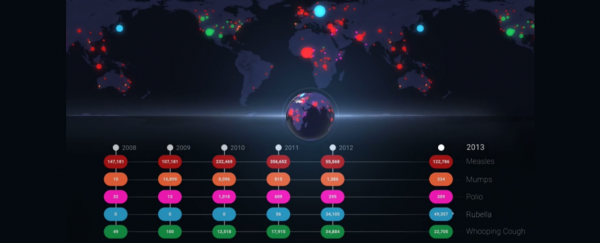It's not just a case of people choosing not to vaccinate their kids - it's also about people around the world who don't have access to them. According to Unicef, more than 30 million children around the world are not immunised, because vaccines are unavailable to them, their local health services are inadequate, or because their families have been misinformed about the practice of immunisation.
Of the latter group, Ben Schiller from Fast Company mentions the Jenny McCarthy-led campaign to try and link vaccinations to autism, and the belief by members of the Pakistani Taliban that vaccines are a CIA plot to quell Islam.
The video above, created by GOOD magazine, shows the impact of those millions who are not vaccinated against diseases such as whooping cough, polio, the measles and the mumps. Using data collected by the Council on Foreign Relations between 2008 and 2014, the visualisation shows that measles is the most widespread preventable disease of the past decade, followed by the mumps and polio. Africa, China and Southeast Asia are the most seriously affected by these diseases.
As Nicole Gregory at GOOD notes, diseases such as measles and whooping cough have spread in middle-class communities in the US - particularly in California - likely due to anti-vaccine campaigns. For example, she reports, in 2010, there were 12,000 reported cases of whooping cough worldwide - 5,000 of which were in California. Since then, this number has risen to almost 8,000 cases this year.
"I see the devastating effects of these infections which are vaccine-preventable," Jeffrey Bender, medical director in the Division of Infectious Diseases at the Children's Hospital Los Angeles in the US told Gregory at GOOD. "The most frustrating part for me is in talking to these families after their child becomes severely ill. I have to tell them that 'yes your child's illness probably could have been prevented.' This is the hardest thing for young parents to hear. All of them tell me that they did not think it could happen to their child. But it does happen."
Sources: GOOD, Fast Company
